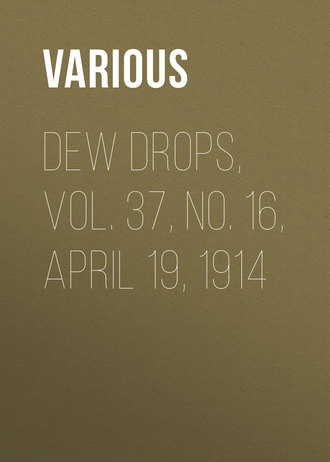
Various
Dew Drops, Vol. 37, No. 16, April 19, 1914
A SYPUR-CAN MOTHER
BY MARY GILBERT
Dorothy Deane and her little brother Laurence were standing by the window watching for papa.
"There he comes!" cried Dorothy at last, and the children raced toward the corner as fast as their chubby little legs would carry them.
"Careful now!" said papa warningly, as the two hurrying little figures reached him. "Don't hit against my dinner pail!"
"What is in it?" asked Dorothy and Laurence in one breath, as they stood on tiptoe, trying to peep inside the cover.
"Guess!" said papa, laughing. "A nickel to the one who guesses right!"
"Candy!" cried Laurence.
"Oranges!" said Dorothy.
Papa shook his head at both these guesses, and at all the others that followed, until they had reached the house.
"Now let mamma have a turn," he said, holding the dinner pail up to her ear.
"Why, it isn't—" mamma began, with a look of greatest surprise.
"Yes, it is!" papa declared. Then he took off the cover and tipped the pail gently over in the middle of the kitchen table and out came ten of the fluffiest, downiest little chickens that any of them had ever seen.
"Oh, oh, oh!" cried the children delightedly. "Are they really ours? Where did you get them?"
"They are power-house chickens," papa replied, smiling at their enthusiasm—"hatched right in the engine room!"
"What do you mean?" asked mamma in astonishment, gazing at the pretty little creatures.
"Just what I say," replied papa, who was an engineer in the big power house down town: "they were hatched on a shelf in the engine room."
"It was just this way," he explained, hanging up his hat. "Tom Morgan brought me a dozen eggs from his new hennery about three weeks ago. I put them on the shelf, intending to bring them home that night, but never thought of them until this morning, when there seemed to be something stirring up there. I looked, and, sure enough, there was a fine brood of chickens, just picking their way out of their shells!"
"But how did it ever happen?" asked mamma in a puzzled tone.
"Because the engine, running night and day, gave the eggs just as much heat as they would have found under a hen's wings," papa replied: "and they thought that they were put up there to hatch."
"Oh, aren't they darlings!" cried Dorothy, clapping her hands as the chickens began to eat the crumbs. "They are the nicest pets that we ever had in all our lives."
While papa was making a nice coop out of a wooden box, mamma found an empty tin can that had once held a gallon of maple syrup. She filled this full of boiling water, screwed the cover on tight, and then wrapped it up in pieces of flannel.
"There," she exclaimed triumphantly, fastening the last strip, "let us see how the chickens like this for a mother!"
Setting the can carefully in the center of the coop, she put the little chickens close by it. Finding it soft and warm, they cuddled up against the flannel cover, and began to chirp as contentedly as if it were a mother hen. Then she pinned a square of flannel to the upper side of the can, letting it spread either way like a mother hen's wings, and leaving the ends open for the chickens to go in and out.
"We will fill the can with hot water every night," said mamma, "and it will keep the chickens warm."
And here they lived quite happily with their syrup-can mother, until papa declared that they were large enough to go to roost in the barn.


